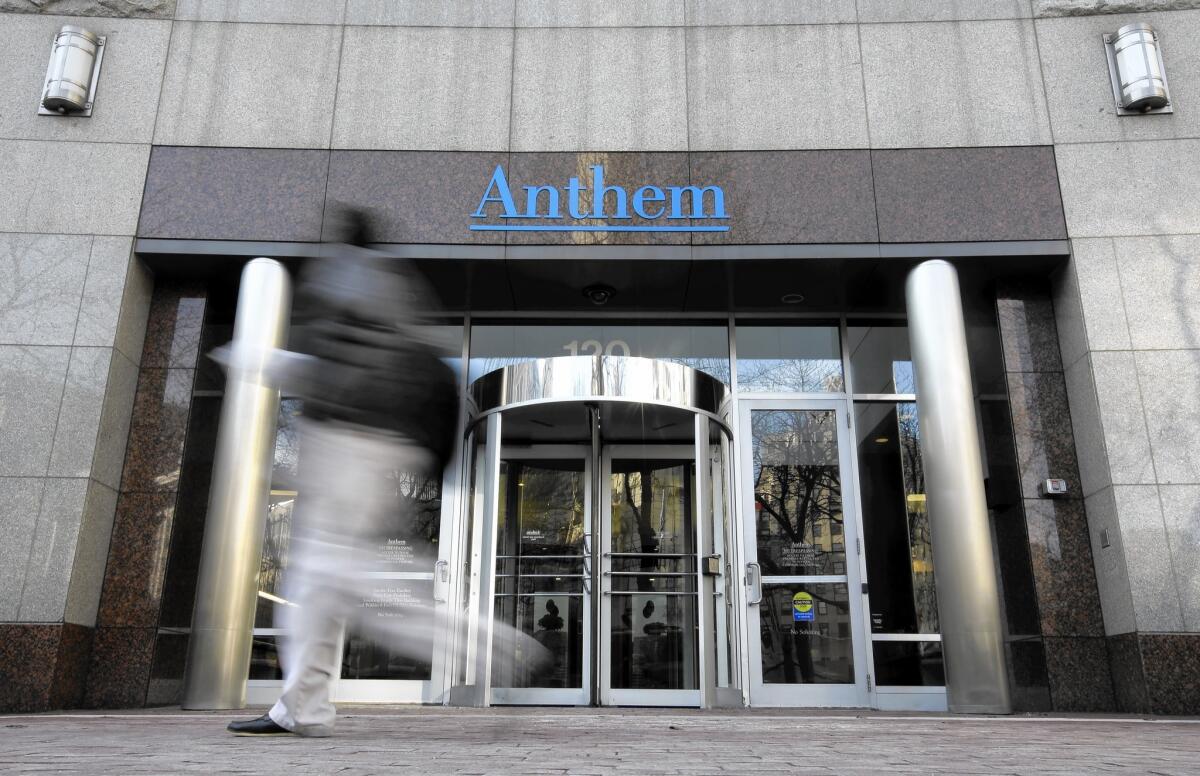Anthem’s good intentions get lost in aggressive telemarketing

Anthem Blue Cross’ aggressive telemarketing is precisely the wrong way to encourage people to take more responsibility for their healthcare.
- Share via
Joseph Goldstein received a call the other day at his West Los Angeles home from someone claiming to represent his insurer, Anthem Blue Cross.
The caller said he knew that one of Goldstein’s family members had been seriously injured in a fall and wanted to make sure that Goldstein knew about Anthem’s wellness and home-care programs.
“They said I had to sign up right away or I’d lose these benefits,” Goldstein recalled. “It was a very hard sell.”
Assuming it was a scam, he hung up. The phone rang again, this time from someone purporting to be an Anthem supervisor.
“They kept calling for several hours, on every line in the house,” Goldstein said.
He shared the caller’s number with me, and a Google search turned up numerous complaints from others who’d received nearly identical calls. Like Goldstein, most of the recipients figured they were being targeted by scammers.
They weren’t. The calls really were from Anthem.
And this is a perfect illustration of how aggressive telemarketing is precisely the wrong way to encourage people to take more responsibility for their healthcare.
All experts agree: If we want to reduce the roughly $3 trillion spent annually on medical treatment in this country, we need to motivate people to take better care of themselves.
“Follow-up care is very important, but it can also be very complicated,” said Shana Charles, director of health insurance studies at UCLA’s Center for Health Policy Research.
“You can be on six different prescriptions that have to be taken at multiple times of the day,” she said. “It can be very hard to follow a regimen.”
A recent study of emergency-room data from California and five other states found that about 53 million ER visits were made from 2006 to 2010. Of that total, roughly 20% of patients returned to the hospital within a month — for the same ailment.
The study, published in the Annals of Internal Medicine, highlights the importance of follow-up care to ensure that patients do their part to get better. And many healthcare companies, from insurers to pharmacies, have programs to remind people to look after themselves.
But first you need to establish a relationship of trust. Anthem’s ill-conceived calls to policyholders show how everything falls apart if you start off on the wrong foot.
“This is an example of what not to do,” Charles said.
Darrel Ng, an Anthem spokesman, said the goal of the calls is to assist patients in following through with prescribed medical treatment or to connect people with a nurse who can answer any questions.
“It’s an effort to make sure people are doing what they’re supposed to be doing,” he said.
Most insurers have similar programs — and that’s a good thing. One problem with the U.S. healthcare system is that we often interact with medical providers at the most expensive levels.
A 2013 study by UC San Francisco found that the median pre-insurance charge for a visit to the ER was $1,233.
The study found that patients’ out-of-pocket ER expenses ranged from $4 to $24,110 for sprains and strains; $15 to $17,797 for headaches; $128 to $39,408 for kidney stones; and $50 to $73,002 for urinary tract infections.
So-called wellness programs, a cornerstone of Obamacare, are intended to cut healthcare costs by promoting healthier behavior. They also provide financial incentives to doctors and insurers to focus on keeping people out of the hospital, not just treating them after they fall ill.
So Anthem gets an A for initiative but an F for execution.
UCLA’s Charles said people have a natural wariness toward calls out of the blue, especially with fraud and identity theft rampant.
Anthem’s position is complicated by what the company in February called a “very sophisticated external cyberattack” that potentially gave hackers access to the account information of up to 80 million policyholders. This month, UCLA Health Systems reported a data breach affecting 4.5 million people.
As a result, Charles said, many people are justified in thinking that a cold call touting additional benefits or treatment might not be on the up and up. Anthem requesting people’s birth year to identify policyholders didn’t help.
Charles and other experts say insurers and doctors generally need to do a much better job educating patients about follow-up care and to inform them in advance that they may be contacted by a nurse or service rep.
My advice to Anthem and others is to reach out to patients by letter, apps, text and email — not by phone — informing them that they need to get in touch to discuss follow-up care. Also include this info with bills.
And why not sweeten the deal? Offer a 5% discount for a future bill or co-pay to anyone who enrolls in a wellness program. This will only pay off for insurers over the long run.
Consumers are naturally on guard against con artists. Any legitimate program that doesn’t recognize this is just bad medicine.
David Lazarus’ column runs Tuesdays and Fridays. He also can be seen daily on KTLA-TV Channel 5 and followed on Twitter @Davidlaz. Send your tips or feedback to david.lazarus@latimes.com.
More to Read
Inside the business of entertainment
The Wide Shot brings you news, analysis and insights on everything from streaming wars to production — and what it all means for the future.
You may occasionally receive promotional content from the Los Angeles Times.











